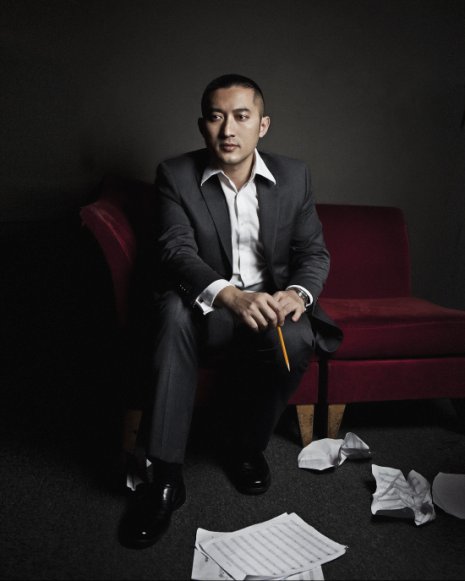In Huang Ruo's Words...
My first music experience was not Western classical music, but Chinese opera. When I was a little kid, my grandmother would take me to the village communal place to see Hainanese Operas outdoors. Although primitive in setting, the local operas made a huge impact on me not only for the moral stories one can learn, but also for becoming a composer and especially an opera composer who integrates both Western and Eastern theaters and operas in my own creations of operatic and theatrical works.
When I was 18, my composition teacher in Shanghai told me that "to learn new music, you must go to the West, to learn new ideas and techniques, but not to forget your own root." These words still sound in my ears. As a Chinese-American composer, my journey of traveling from the East to the West, later on, form my 3rd culture, the Asian-American culture, becoming the foundation of my music.
I started as a symphonic and chamber music composer writing a large amount of instrumental works. However, I realized that my music has often been programed and pigeonholed at the themed concerts such as: Lunar New Year concert, Chinese New Year concert, Asian music concert, Celebrate-Asian night, etc.
There was a time when it was very hard for my music to be programed as part of regular subscription series by symphonic orchestras because orchestras already “found” the spot for my kind of music and my kind of composers. This struggle was not unique to me, but also has been shared by other BIPOC and AAPI composers.
Not seeing much hope in the symphonic world, in 2008 I turned to opera, thinking that there is no opera house would program an entire season of Asian or Asian-American operas; my work could finally be programed in the regular subscription season alongside Wagner, Verdi, and Puccini. I started writing opera in Chinese, and then in English.
By now I have written nine operas; each one of them with Asian subjects, or Asian-American subjects. I realized that I consciously and unconsciously pigeonholed myself into writing 'themed' operas. The very thing I tried so hard to avoid, I am now embracing. The truth is there are so many timely and important Asian and Asian-American stories to be written and told -- yet not by the creators from their communities. Who tells those stories is important. As an Asian-American composer, I feel strongly that it is my task to tell our stories through operas. So I hope to write more - as many as I can - in the future.
Stravinsky once famously said that “COMPOSERS COMBINE NOTES, THAT’S ALL.”
With all due respect to Stravinsky, I personally firmly believe that music is more that combination of notes. Particularly in the 21st Century, in a diverse world of today, with so many styles and ways to compose by so many diverse groups of people for so many purposes and reasons.
To me, writing music has reasons, which can be to inspire, to connect, to express, to tell a story, to love, to mourn, even to say nothing yet keep saying it...
Regarding three of my recent works:
Book of Mountains and Seas, Vocal-Theatre in 4 Scenes, 2023
A fantastical world of sunbirds, demons and hairy giants is evoked in Book of Mountains and Seas, a work of vocal theater for 12 singers, two percussionists and six puppet masters. My inspiration comes from a classic compilation of Chinese mythology first transcribed in the fourth century B.C. Over the years, these stories have shifted and been reshaped, becoming part of Chinese written and oral history. Told through the lens of our modern-day relationship with the natural world, the ancient stories of creation and destruction conjure a sense of respect and awe for the environment and the water stories challenge us to be good stewards of the natural resources we have been given. Book of Mountains and Seas speaks of the universe, creation, planet, nature, life, human ambition and fate, the relationship and interaction between mankind and the world we live in.
Angel Island, Opera-Theatre in 8 Scenes, 2024
Between 1910 and 1940, as new immigrants flowed through the immigration station on Angel Island in the San Francisco Bay, Chinese immigrants faced massive discrimination because of America’s earliest racist immigration legislations. Being held for sometimes up to years in brutal conditions at the detention center on Angel Island, many of these immigrants looked for solace by inscribing poetry onto the walls that confined them. Inspired by the Chinese poems carved on the wooden walls of the detention center and events of the time, Angel Island weaves a story of immigration, discrimination, and confinement - bringing history into the reality of our current lives.
M. BUTTERFLY, An opera in 3 Acts, 2022 [Music: Huang Ruo; Libretto: David Henry Hwang]
M. BUTTERFLY was inspired by a real-life illicit affair between a French diplomat and his mistress, a Chinese opera diva, which began in 1960’s Beijing and eventually continued in Paris. In 1986, the couple was arrested for espionage in France, where it was revealed that the Chinese star was not only a spy, but also a man in drag. The real-life diplomat, Bernard Boursicot, claimed not to have known that his lover of two decades, Shi Peipu, was a biological man. The obvious question reverberated through France and the world: how could he not have known?
On hearing the story, playwright David Henry Hwang asked himself, “What did the diplomat think he had found?” The answer eventually came to him: Boursicot thought he had found his own Madame Butterfly. In M. BUTTERFLY, Hwang dovetails the plot of Madama Butterfly with the events of the spy story. The diplomat, rechristened “Rene Gallimard,” meets the Chinese opera singer, “Song Liling,” and begins to fantasize that he is Pinkerton, the American lieutenant from Puccini’s opera. Like Pinkerton, Gallimard becomes seduced, not simply by Song’s manipulations, but also by his own fantasies of Asian females as submissive creatures raised to sacrifice, serve, and suffer for men – particularly, Western men. Gallimard believes that he has found “the perfect woman.” His stereotypes of obedient “Oriental” women mirror his nation’s belief in docile Asian nations that secretly wish to be dominated by stronger Western powers. Like the West, however, Gallimard’s fantasy cannot last forever. By the end of the play, he realizes that it’s actually he who was Butterfly, deceived by a duplicitous lover. And the Chinese spy who perpetrated that deceit, was therefore the real Pinkerton.


